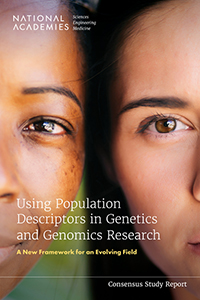Genetic and genomic information has become far more accessible, and research using human genetic data has grown exponentially over the past decade. Genetics and genomics research is now being conducted by a wide range of investigators across disciplines, who often use population descriptors inconsistently and/or inappropriately to capture the complex patterns of continuous human genetic variation.
Use of Population Descriptors in Genomics
The Division of Genomics and Society created an explainer about population descriptors and its evolving use in genetics and genomic research.
The explainer gives a thorough overview of population descriptors, their relation to genetic ancestry, their use in society throughout the last few decades, and the importance of using these terms intentionally in genomics research and health. The explainer also includes numerous references and links to further reading.
Learn More
Report: Using Population Descriptors in Genetics and Genomics Research

In response to a request from the National Institutes of Health, the National Academies assembled an interdisciplinary committee of expert volunteers to conduct a study to review and assess existing methodologies, benefits, and challenges in using race, ethnicity, ancestry, and other population descriptors in genomics research. The resulting report focuses on understanding the current use of population descriptors in genomics research, examining best practices for researchers, and identifying processes for adopting best practices within the biomedical and scientific communities.
- Read the Report: Use of Race, Ethnicity, and Ancestry as Population Descriptors in Genomics Research
- Read the NIH Director's Statement: NIH-funded NASEM report recommends best practices for use of population descriptors in genetics and genomics research
Last updated: December 7, 2023
